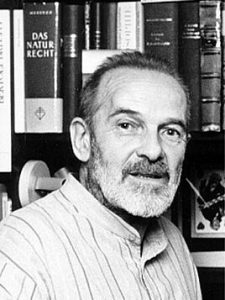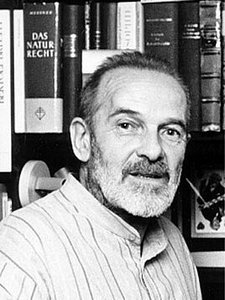
Hermann Klenner (1926-*) was an East German legal scholar and representative of the German Democratic Republic at the United Nations Commission on Human Rights. As the leading theorist of “socialist human rights” in the GDR, Klenner was influential in the field of international law, but also highly political active and a driving force within the state sponsored GDR-Committee for Human Rights. While serving in the Second World War, Klenner joined the Nazi Party at the age of 18, but in the post-war period he became a dedicated socialist. Gaining his doctorate at the University of Halle in 1951 he began working at Humboldt University in East Berlin, where, by the age of 30, he was made professor of legal theory and the history of law. Despite a rapid rise in the GDR legal profession, his work was deemed revisionist at the Babelsberg Conference in 1958 for alleged claiming that law could possibly bind the power of the party. Stripped of his academic position in Berlin, he was sent for “re-education” by working as the mayor of Letschin, a village on the border with Poland. Upon his return to legal academia, he worked at the College of Economics in Karlshorst, an East Berlin suburb.
Klenner turned to the problem of socialism and human rights for his Habilitation work, which was published in 1964 with the title Studies on Basic Rights (Studien über die Grundrechte). In this work, he constructed a new history and philosophy of “socialist human rights,” which were qualitatively different, and superior, to bourgeois human rights. According to Klenner, universal human rights were only realised through the Russian Revolution in 1917, not the bourgeois revolutions, which preceded it. The abolition of capitalism allowed for new form of human rights free from exploitation to be realized. Drawing from the contemporary claims to human rights and self-determination from the decolonizing world, Klenner argued that only socialism allowed for real self- determination in which the interests of the individual and society were not in conflict, indeed – they were one and the same. This logic extended to the international system, where the socialist bloc was the only possible guarantor of human rights to the developing world against the exploitations of the imperialist and racist West.
Based on the success of his writing on socialist human rights, Klenner joined the GDR-Committee for Human Rights, becoming its leading theorist alongside Bernhard Graefrath. Again accused of ideological revisionism for his legal scholarship in 1969, Klenner’s career was saved when he agreed to work as an informant for East Germany’s Ministry for State Security (under the designation IMS/IMB “Klee”). In 1976 he was selected to be a member of the Presidium of the GDR-Committee for Human Rights and wrote extensively on the subject through that decade for a domestic and international audience. In 1982, he published his magnum opus on the subject, Marxism and Human Rights. In 1984, he became a Vice Chair of the UN Human Rights Commission and while he was poised to become chair two years later, he was forced to resign due to American and Israeli protests over Klenner’s past as a member of the Nazi Party. During the collapse of the GDR, Klenner chaired the Round Table talks at the Academy of Sciences. After German unification, Klenner was later active with the Socialist Unity Party successor, the Party of Democratic Socialism (since 2005, Die Linke).
Ned Richardson-Little (University of Erfurt)
Bibliography
-
Klaus Adomeit, “Rechtsphilosophie, Marxismus und Menschenrechte: Zum Erscheinen einer Festschrift für Hermann Klenner,” Juristen Zeitung 53, no. 4 (1998), 186–91
-
Andreas Fisahn, “Marxismus und Menschenrechte,” Argumente 4, no. 2 (2011), 22–28
-
Uwe-Jens Heuer, “Hermann Klenner – ein moderner Enzyklopädist,” Z: Zeitschrift marxistische Erneuerung 65 (2006)
-
Hermann Klenner, Der Marxismus-Leninismus über das Wesen des. Rechts. VEB Deutscher Zentralverlag, Berlin 1954
-
Hermann Klenner, Studien über die Grundrechte mit Dokumentenanhang, Berlin 1964
-
Hermann Klenner, Marxismus und Menschenrechte. Studien zur Rechtsphilosophie. Anhang: Menschenrechtskataloge aus Vergangenheit und Gegenwart, Berlin 1982


